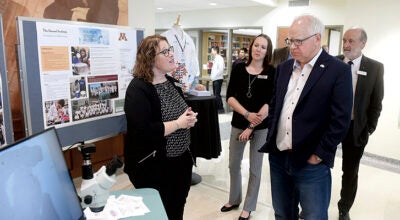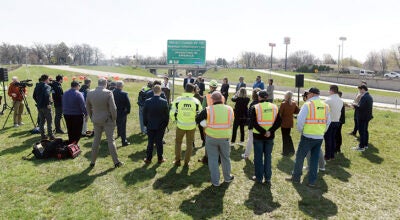Republicans dig in, hold up infrastructure bill in the Senate
Published 8:29 pm Friday, March 17, 2023

- Herald file photo
|
Getting your Trinity Audio player ready...
|
Local leaders voice frustration at yet another hurdle to secure bonding funds
In another detour on the road for Minnesota’s $1.9 billion infrastructure bill, Minnesota Senate Republicans on Thursday blocked its passage, at least momentarily, sending Democrats back to the drawing board in an effort to secure funds for infrastructure projects around the state.
The Minnesota House passed the bill earlier this month that would provide bonding money for roads, bridges and other infrastructure needs, including Austin’s $105 million wastewater treatment plant project.
While several Republicans crossed the aisle to support passage of the bill in the House, not a single Senate Republican voted for the bill, opting instead to demand tax relief prior to any passage of the bonding bill.
Should the infrastructure package fail to pass this year, it would mark a third consecutive session that the bill failed to get passed.
Sen. Gene Dornink (R-23) issued a statement Friday morning regarding the move and argued that tax breaks must come first.
“From food to energy prices, inflation continues to affect all parts of Minnesotans’ budgets,” Dornink said. “Therefore, we must invest in Minnesota families now before we mortgage another $1.5 billion in taxpayer dollars. And with the governor looking to increase state spending by 25%, it is even more critical for tax relief to precede a bonding bill.”
He said DFL leaders have said they support tax relief, but no other specifics about their level of support have yet been discussed. Without knowing the DFLers plans for tax relief, Dornink said he and all of the other Republican senators voted to table the bill, at least for the moment. He said bonds aren’t released until August, so it could be approved later in the session.
The senators also hoped part of the state’s $17.5 billion surplus could be used to fund projects, rather than issuing bonds.
“We’re just a little concerned with all the money that’s being spent and that they’re trying to put it on the credit card before we find out some of these things,” Dornink said.
Using a framework similar to last year, Austin was again requesting $14.5 million that would go toward the wastewater treatment plant project. Down from an initial $20 million requested.
The city is already feeling the pinch of not getting money from last year’s session, which was pulled out from underneath it when a deal to secure the bill failed at the last minute.
As a result, the city found itself needing to make up $8 million in revenue.
Late last year, the council voted to increase sewer fees by 15% this year, 10% next year and 7% in 2025 and 2026 to make up that difference — a direct result of missing out on bonding funds.
When the bill passed in the House earlier this month it did so with 21 Republicans joining Democrats resulting in a 91-43 vote to move the bill to the Senate.
Democrats hold a 34-33 majority but needed at least seven Republicans to cross the aisle for the bill to pass. Bonding bills require a three-fifths majority because they would incur debt by issuing bonds to pay for the projects.
“It was a hard vote, and I hated it,” Dornink said, noting it had been a difficult week for him.
Local leaders were both optimistic and guarded as the bill moved on to the Senate, however, with this latest development, that frustration has carried over.
“We’ve had a front row seat for the legislature’s dysfunction for several years with trying to get a bonding bill through the process for fair partnerships on state and local projects,” said Austin City Administrator Craig Clark on Friday. “To see it caught up again in more political games is definitely frustrating.”
In particular, it’s the party politics that are beginning to grate on city leaders, including Mayor Steve King.
“They seem to be doing right by their party, but not the people they represent,” King said. “And that’s disappointing. There’s this surplus and neither party wants to give the other party a win.”
Austin’s share of the bonding money was slated to come out of the cash-only portion of the package, which totals $393 million. The rest, $1.5 billion, will be borrowed by the state, a sticking point for Senate Republicans.
“We’re still optimistic that legislation can still come together before the conclusion of the session and they will do the right thing by Minnesotans and pass an effective bonding bill,” Clark said. “Our is a core infrastructure project. It’s a need, not a want.”
There is a chance the bill could come up again later, and some in the Senate, including Capital Investment Chair Sandra Pappas, DFL-St. Paul, are considering using a part of the state’s $17.5 billion budget surplus to provide funding for projects like Austin’s wastewater treatment plant.
However, if the Legislature opts to go a cash-only route, it’s very possible that money could be taken away from other projects within the state, including the possibility of Republican supported projects.
Dornink said though he recognizes that local government leaders are frustrated that the bill has not been approved, he still is hopeful.
“I believe we’ll get it done,” he said. “We were just trying to make an appeal for the taxpayers.”
However, city leaders are wondering why there can’t be infrastructure support and tax relief.
“There’s always room for compromise,” King said. “When you have a nearly $18 billion budget surplus, I don’t care if you’re Republican or Democrat — we can do both. I don’t care what your politics are, communities need that money.”
— Sarah Stultz contributed to this story





